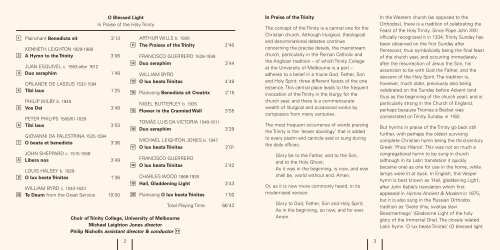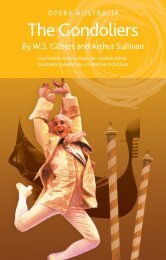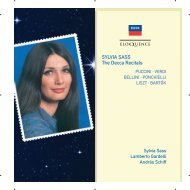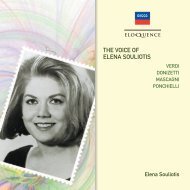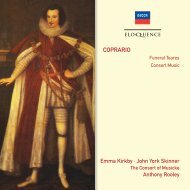You also want an ePaper? Increase the reach of your titles
YUMPU automatically turns print PDFs into web optimized ePapers that Google loves.
1 Plainchant Benedicta sit 3’13<br />
KENNETH LEIGHTON 1929-1988<br />
2 A Hymn to the <strong>Trinity</strong> 3’06<br />
JUAN ESQUIVEL c. 1563-after 1612<br />
3 Duo seraphim 1’48<br />
ORLANDE DE LASSUS 1532-1594<br />
4 Tibi laus 1’25<br />
PHILIP WILBY b. 1949<br />
5 Vox Dei 3’48<br />
PETER PHILIPS 1560/61-1628<br />
6 Tibi laus 3’03<br />
GIOVANNI DA PALESTRINA 1525-1594<br />
7 O beata et benedicta 3’36<br />
JOHN SHEPPARD c. 1515-1558<br />
8 Libera nos 3’49<br />
LOUIS HALSEY b. 1929<br />
9 O lux beata Trinitas 1’36<br />
WILLIAM BYRD c. 1540-1623<br />
0 Te Deum from the Great Service 10’00<br />
O Blessed Light<br />
In Praise of the Holy <strong>Trinity</strong><br />
Choir of <strong>Trinity</strong> College, University of Melbourne<br />
Michael Leighton Jones director<br />
Philip Nicholls assistant director & conductor !<br />
2<br />
ARTHUR WILLS b. 1926<br />
! The Praises of the <strong>Trinity</strong> 2’40<br />
FRANCISCO GUERRERO 1528-1599<br />
@ Duo seraphim 3’44<br />
WILLIAM BYRD<br />
£ O lux beata Trinitas 4’48<br />
$ Plainsong Benedicta sit Creatrix 2’15<br />
NIGEL BUTTERLEY b. 1935<br />
% Flower in the Crannied Wall 3’55<br />
TOMÁS LUIS DA VICTORIA 1548-1611<br />
^ Duo seraphim 3’29<br />
MICHAEL LEIGHTON JONES b. 1947<br />
& O lux beata Trinitas 2’01<br />
FRANCISCO GUERRERO<br />
* O lux beata Trinitas 2’42<br />
CHARLES WOOD 1866-1926<br />
( Hail, Gladdening Light 3’43<br />
) Plainsong O lux beata Trinitas 1’50<br />
Total Playing Time 66’42<br />
In Praise of the <strong>Trinity</strong><br />
The concept of the <strong>Trinity</strong> is a central one for the<br />
Christian church. Although liturgical, theological<br />
and denominational debates continue<br />
concerning the precise details, the mainstream<br />
church, particularly in the Roman Catholic and<br />
the Anglican tradition – of which <strong>Trinity</strong> College<br />
at the University of Melbourne is a part –<br />
adheres to a belief in a triune God, Father, Son<br />
and Holy Spirit: three different facets of the one<br />
essence. This central place leads to the frequent<br />
invocation of the <strong>Trinity</strong> in the liturgy for the<br />
church year, and there is a commensurate<br />
wealth of liturgical and occasional works by<br />
composers from many centuries.<br />
The most frequent occurrence of words praising<br />
the <strong>Trinity</strong> is the ‘lesser doxology’ that is added<br />
to every psalm and canticle said or sung during<br />
the daily offices:<br />
Glory be to the Father, and to the Son,<br />
and to the Holy Ghost;<br />
As it was in the beginning, is now, and ever<br />
shall be, world without end. Amen.<br />
Or, as it is now more commonly heard, in its<br />
modernised version:<br />
Glory to God, Father, Son and Holy Spirit;<br />
As in the beginning, so now, and for ever.<br />
Amen.<br />
3<br />
In the Western church (as opposed to the<br />
Orthodox), there is a tradition of celebrating the<br />
Feast of the Holy <strong>Trinity</strong>. Since Pope John XXII<br />
officially recognised it in 1334, <strong>Trinity</strong> Sunday has<br />
been observed on the first Sunday after<br />
Pentecost, thus symbolically being the final feast<br />
of the church year, and occurring immediately<br />
after the resurrection of Jesus the Son, his<br />
ascension to be with God the Father, and the<br />
descent of the Holy Spirit. The tradition is,<br />
however, much older, previously also being<br />
celebrated on the Sunday before Advent (and<br />
thus as the beginning of the church year), and is<br />
particularly strong in the Church of England,<br />
perhaps because Thomas à Becket was<br />
consecrated on <strong>Trinity</strong> Sunday in 1162.<br />
But hymns in praise of the <strong>Trinity</strong> go back still<br />
further, with perhaps the oldest surviving<br />
complete Christian hymn being the third-century<br />
Greek ‘Phos Hilaron’. This was not so much a<br />
congregational hymn to be sung in church<br />
(although in its Latin translation it quickly<br />
became one) as one for use in the home, while<br />
lamps were lit at dusk. In English, this Vesper<br />
hymn is best known as ‘Hail, gladdening Light’,<br />
after John Keble’s translation which first<br />
appeared in Hymns Ancient & Modern in 1875,<br />
but it is also sung in the Russian Orthodox<br />
tradition as ‘Svete tihiy, sviatiya slavi<br />
Bessmertnago’ (Gladsome Light of the holy<br />
glory of the Immortal One). The closely related<br />
Latin hymn ‘O lux beata Trinitas’ (O blessed light


